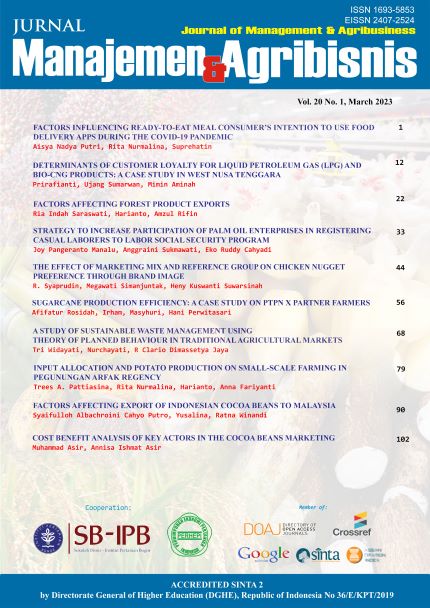A Study of Sustainable Waste Management Using Theory of Planned Behaviour in Traditional Agricultural Markets
Abstract
The waste management of agricultural commodities in traditional markets need serious attention as they remain because agricultural commodities usually pollute the streets and public spaces. This had a detrimental impact on both public health and traditional market image. By using the perspective of the Theory of Planned Behavior (TPB), the study was conducted to empirically examine the effects of attitudes, subjective norms, and perceived behavioral control (PBC) on the intention and behavior of separating waste in traditional markets. The research was conducted in a quantitative design. The sampling technique used was simple random sampling. A total of 210 agricultural commodity traders in traditional markets in Semarang was taken as sample in this study. The data was analyzed by using Structural Equation Modeling (SEM) with SmartPLS software. The results showed that attitudes, subjective norms, and PBC had significant effects on increasing intention in separating waste, which in turn would imply increasing the behavior in separating waste. The findings also report the mediating role of intention in strengthening the TPB constructs on behavior. This study emphasized the importance of establishing sustainable waste management and the connection between the behavior of waste management and to the adoption of a circular economy to make a more strategic impact to society and economy.
Keywords: theory of planned behavior, agribusiness, waste management, traditional markets
Authors
Authors who publish with this journal agree to the following terms:
- Authors retain copyright and grant the journal right of first publication with the work simultaneously licensed under a Creative Commons Attribution License that allows others to share the work with an acknowledgement of the work's authorship and initial publication in this journal.
- Authors are able to enter into separate, additional contractual arrangements for the non-exclusive distribution of the journal's published version of the work (e.g., post it to an institutional repository or publish it in a book), with an acknowledgement of its initial publication in this journal.
- Authors are permitted and encouraged to post their work online (e.g., in institutional repositories or on their website) prior to and during the submission process, as it can lead to productive exchanges, as well as earlier and greater citation of published work (See The Effect of Open Access).

